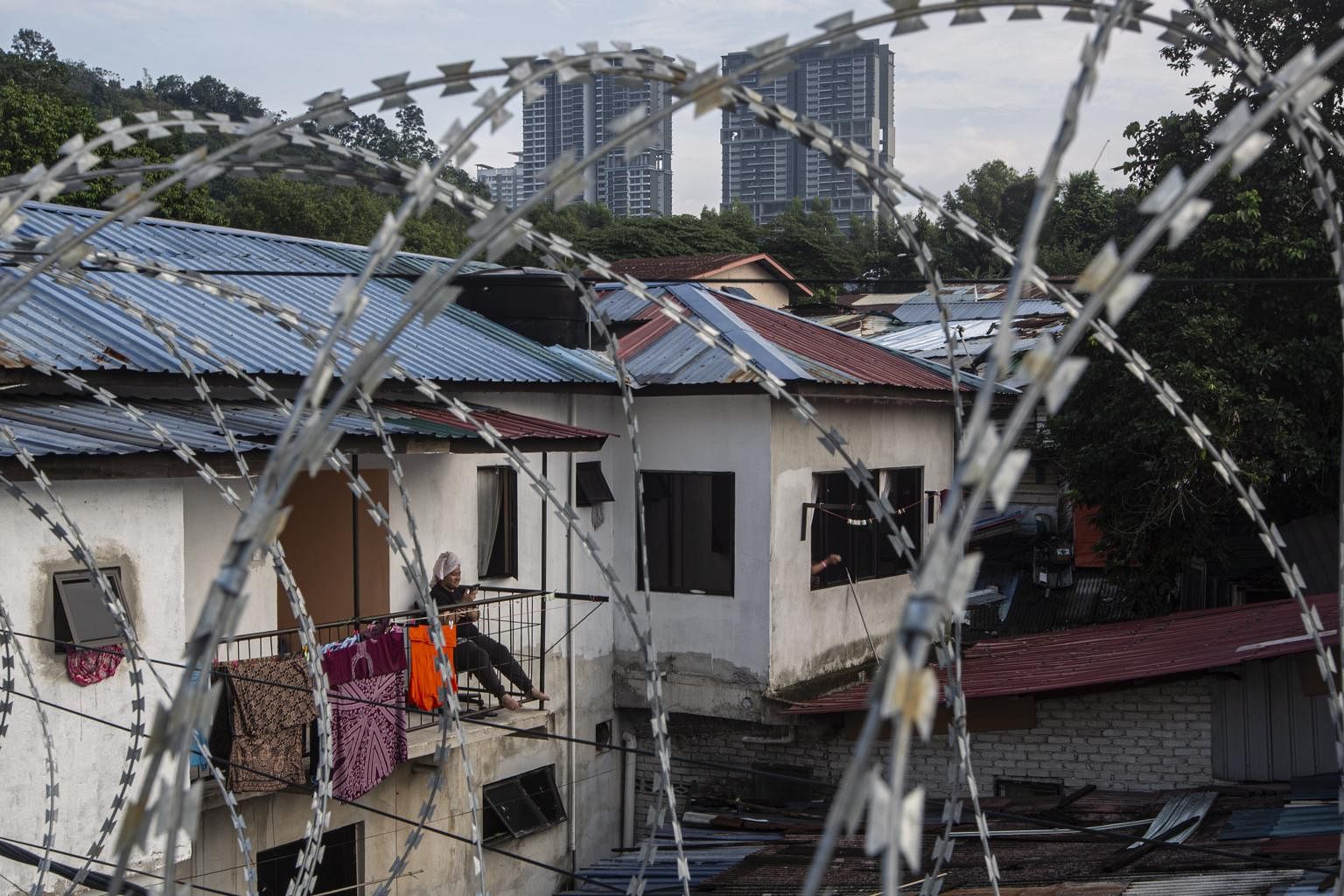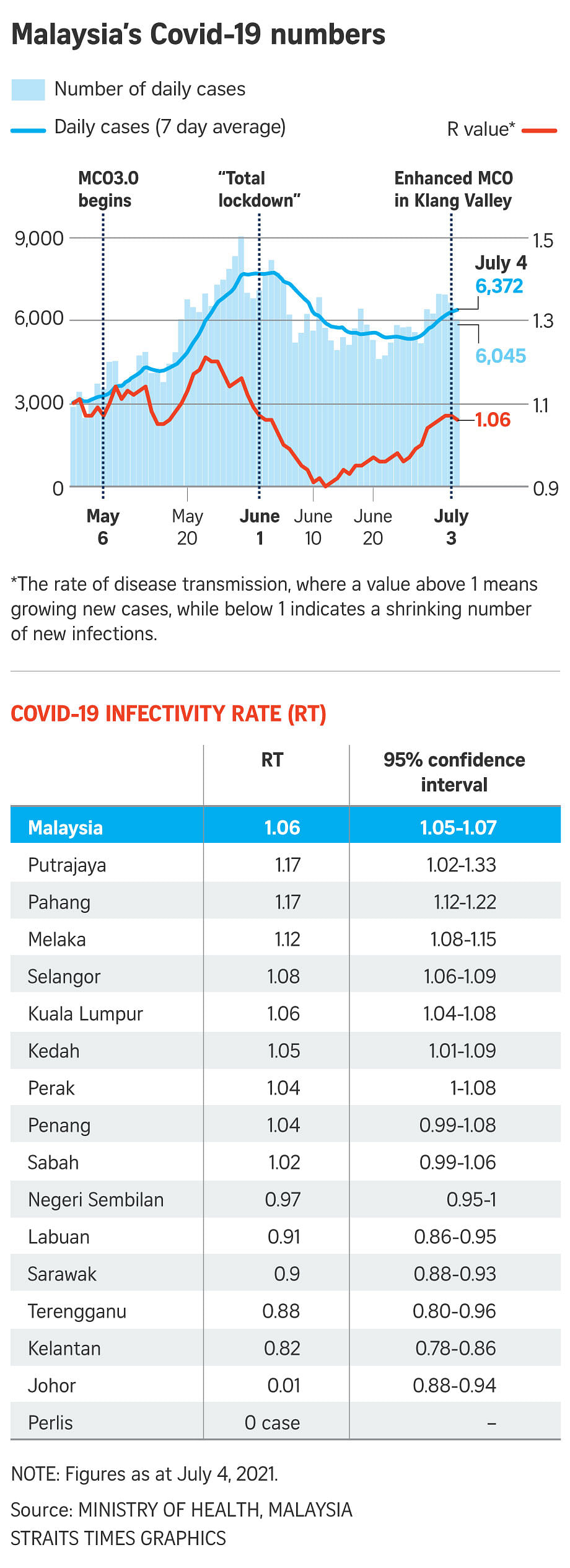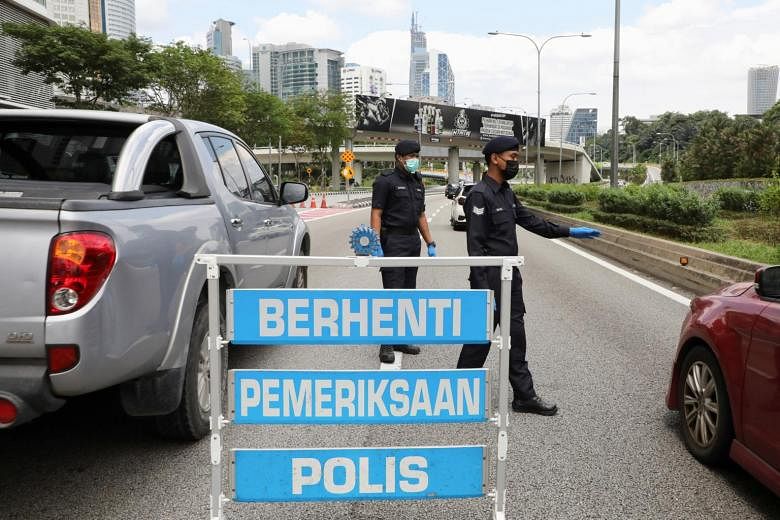KUALA LUMPUR - Too many exemptions and too little testing amid far more aggressive variants have derailed Malaysia's latest lockdown to try to control the Covid-19 pandemic, experts say.
Soaring numbers of cases and deaths in April forced a re-imposition of the movement control order (MCO) that twice previously, including in January this year, effectively curbed Covid-19 waves.
But the "MCO 3.0" imposed on May 6 followed by five weeks of what the government termed "total lockdown" - even though 17 sectors, including large swathes of manufacturing, were allowed to operate at 60 per cent capacity - has failed to repeat earlier successes.
A team of specialists who call themselves the Health and Sciences Covid-19 Advisory Group of Experts said that during the lockdown, "ground scan reveals there are challenges in policy implementation and systemic gaps".
Chaired by former health director-general Abu Bakar Suleiman and representatives from Malaysia's top medical associations, the group stressed the need for "effective, efficient, and inclusive vaccine roll-out" and "automation and digital Find, Test, Trace, Isolate and Support (FTTIS)".
When the MCO began in early May, daily infections averaged below 4,000 and deaths below 20.
These figures rose to around 7,600 new cases and 70 deaths a day when the lockdown started on June 1.
Today, the daily averages are still more than 6,300 cases and nearly 80 deaths.
But it is likely that the true extent of the pandemic is far grimmer.
At no point since MCO 3.0 was extended nationwide on May 12, did the average positive rate in testing - the percentage of all tests that returned positive for Covid-19 - drop below the World Health Organisation's 5 per cent benchmark.
The average positive rate spiked to a high of more than 8 per cent at the beginning of last week.
This implies that not enough testing is being done to monitor the outbreak.
Early this year, the Ministry of Health (MOH) reduced the level of contact tracing and only tested symptomatic close contacts.
For clusters, only 20 samples were taken if the number at risk was less than 50. For larger exposures, 30 samples or 10 per cent, whichever was lower, was deemed sufficient.
"Very specific recommendations and key performance indicators of the FTTIS have been forwarded to the Ministry of Health," said opposition coalition Pakatan Harapan's health committee on Monday (July 5), referring to its own proposal as well as those from various quarters.
"They have adamantly refused to transform their FTTIS policy and it is business as usual. The nation is paying a dear price for their folly."
Despite workplace clusters contributing to two-thirds of an average of 150 new clusters weekly during the lockdown, the government has insisted it is unfair to single out these exclusions, especially factories where employees often live and work in close quarters.
The number of active clusters has doubled to nearly 900, compared with early May.
Senior Minister for the Economy Azmin Ali claimed last week that of the 507 new clusters in the country between June 1 and June 23, 195 were linked to the manufacturing sector.
Cases in these clusters accounted for only 9 per cent of all patients detected during the period, whereas sporadic cases made up more than three-quarters of infections.
But Universiti Putra Malaysia associate professor of epidemiology Malina Osman told The Straits Times that "this should not be misunderstood as if clusters are segregated. From an epidemiology point of view, we talk about possible sources of infection which then potentially spread to a larger community".

Universiti Sains Malaysia associate professor of biostatistics Kamarul Imran Musa also pointed to MOH data showing that nearly one in four tests of workplace clusters returned positive for Covid-19, indicating "workers are at very high risk of getting and transmitting the virus".
The current onslaught follows the spread of more infectious and deadly strains that began in March, the same month "MCO 2.0" was lifted.
However, Malaysia's genomic analysis levels are too low to accurately measure the extent of their distribution.
Dr Malina said "failures to comply fully with standard operating procedures would allow the risk of transmission, and this became more obvious with the Delta variant, which has been found to be more transmissible".
Last Saturday, nearly the entire Klang Valley was placed under enhanced MCO (EMCO), the strictest protocol.
All non-essential activity in the nation's economic engine and most-populous area - which accounts for more than half of recent cases - has been banned.
But without more effective contact tracing, containment could be many weeks away.
"Malaysia's restrictions so far have not come hand in hand with non-lockdown measures. Other components need strengthening or transparency, such as contact tracing, speedier vaccination and more clarity on the extent of new variants," independent health policy consultant Khor Swee Kheng told ST.
The senior visiting fellow at the United Nations University, Tokyo, added that "the EMCO, similarly, can be a definitive success only if there are meaningful non-lockdown measures, otherwise the path to reducing transmission will be slow and onerous."













